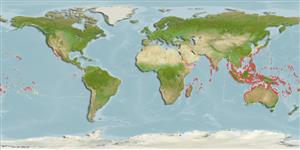Bivalvia |
Ostreida |
Isognomonidae
Environment: milieu / climate zone / depth range / distribution range
Ecology
Benthic; depth range 0 - 20 m (Ref. 348). Tropical
Indo-West Pacific: from eastern and southern Africa, to western Polynesia; north to Japan and Hawaii, and south to New Caledonia; Society Islands, eastern Polynesia.
Length at first maturity / Size / Weight / Age
Maturity: Lm ? range ? - ? cm Max length : 7.5 cm ShL male/unsexed; (Ref. 348); common length : 4.0 cm SL male/unsexed; (Ref. 348)
Byssally attached to rocks, on reef flats or to the underside of boulders, on sand and gravel bottoms. May also occur at sub-littoral (Ref. 348) and intertidal depths on soft sediments (Ref. 87907).
Life cycle and mating behavior
Maturity | Reproduction | Spawning | Eggs | Fecundity | Larvae
Members of the class Bivalvia are mostly gonochoric, some are protandric hermaphrodites. Life cycle: Embryos develop into free-swimming trocophore larvae, succeeded by the bivalve veliger, resembling a miniature clam.
Poutiers, J.M. 1998 Bivalves. Acephala, Lamellibranchia, Pelecypoda. p. 123-362. In Carpenter, K. E. and V. H. Niem. 1998. FAO species identification guide for fishery purposes. The living marine resources of the Western Central Pacific. Volume 1. Seaweeds, corals, bivalves, and gastropods. Rome, FAO. (Ref. 348)
IUCN Red List Status
(Ref. 130435: Version 2025-1)
CITES status (Ref. 108899)
Not Evaluated
Not Evaluated
Threat to humans
Harmless
Human uses
| FishSource |
Tools
More information
Trophic EcologyFood items (preys)
Diet composition
Food consumption
Predators
Population dynamicsGrowthMax. ages / sizesLength-weight rel.Length-length rel.Length-frequenciesMass conversionAbundance Life cycleReproductionMaturityFecunditySpawningEggsEgg developmentLarvae PhysiologyOxygen consumption
Human RelatedStamps, coins, misc.
Internet sources
Estimates based on models
Preferred temperature
(Ref.
115969): 24.6 - 29.3, mean 28.4 (based on 3503 cells).
Fishing Vulnerability
Low vulnerability (10 of 100).
Price category
Unknown.
